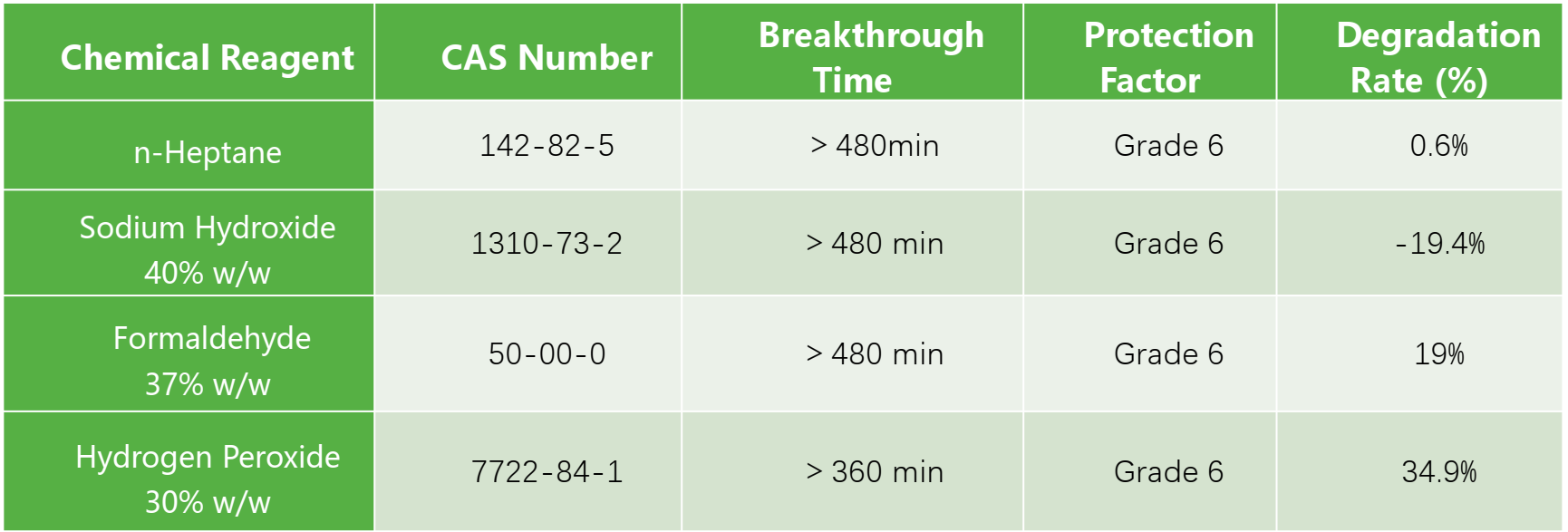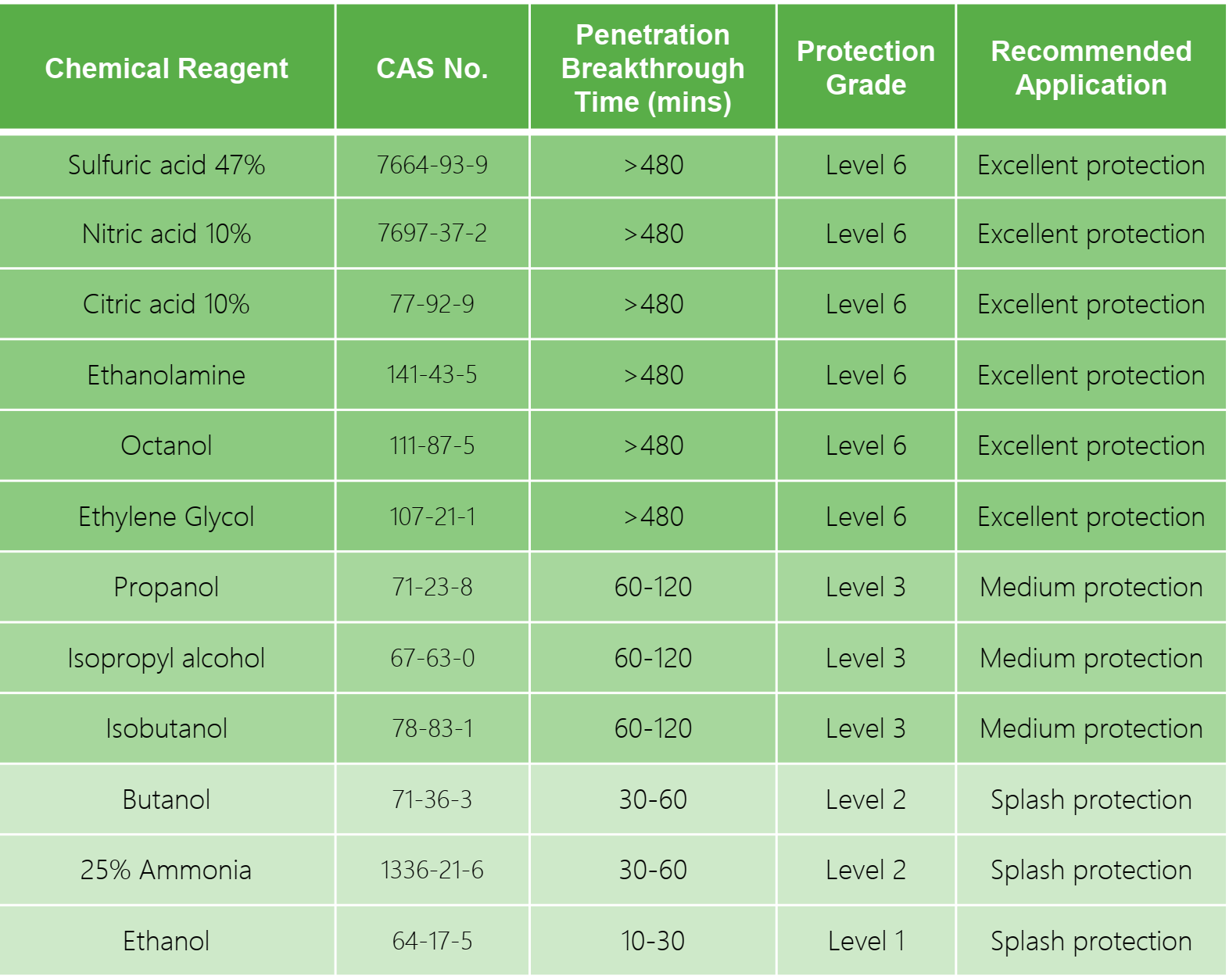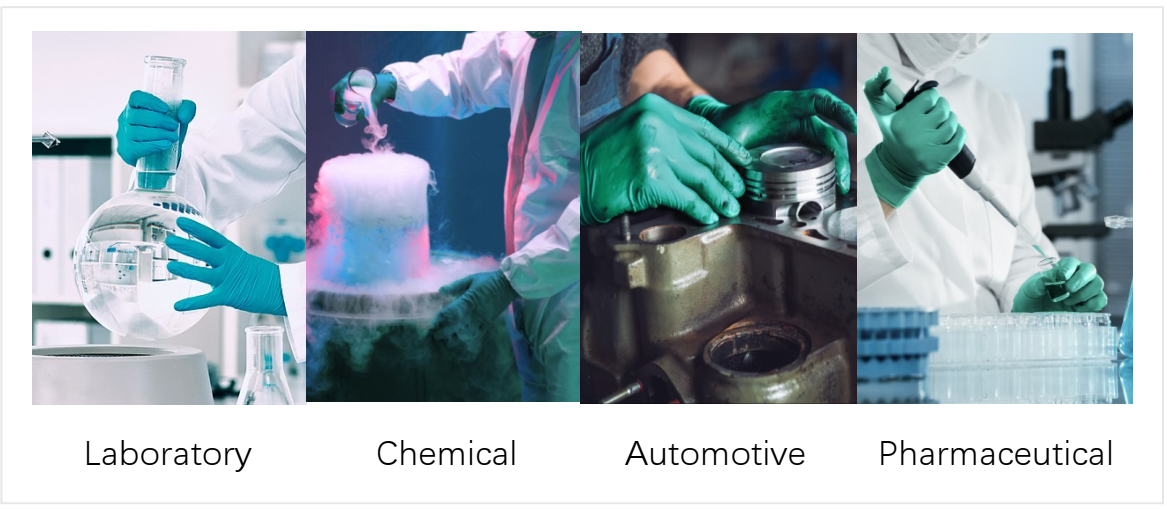With the continuous increase in safety requirements across industries such as manufacturing, chemical processing, and laboratories, ordinary nitrile gloves can no longer meet the high protection needs in certain work scenarios, prompting the emergence of high-level chemical-resistant nitrile gloves.
This article will delve into the technical characteristics and test data to showcase the advantages of high-level chemical-resistant gloves in terms of chemical protection, abrasion resistance, and other aspects. It will also provide specific industry solutions for chemical-resistant gloves to meet the protection needs of various industries.
I. Characteristics of Chemical-Resistant Nitrile Gloves
Chemical Protection Performance
Chemical-Resistant Nitrile Gloves, employing a special latex formula and vulcanization system, exhibit superior permeation resistance. They are ideal for environments with corrosive chemicals like strong acids, bases, and organic solvents.
Tests show that these gloves can resist permeation by sodium hydroxide, formaldehyde, and n-heptane for 480 minutes each, and by hydrogen peroxide for 360 minutes, far exceeding ordinary nitrile gloves in protective capability.
Test Method: EN 16523-1:2015+A1:2018
Kingfa has established a testing platform for assessing the chemical permeation performance of gloves based on the test methods EN 16523-1:2015+A1:2018. This platform is used to evaluate the requirements for glove permeation performance in different application scenarios, thereby providing safer and more effective protection solutions for wearers.

Mechanical Properties
Kingfa Chemical-Resistant Nitrile Gloves feature enhanced abrasion resistance and tear strength through optimized vulcanization systems. This makes them more durable in high-frequency and rough environments, suitable for heavy industries and high-friction applications.
Abrasion test data indicates that the chemical-resistant nitrile gloves can withstand up to 2,000 revolutions before showing signs of wear, while ordinary nitrile gloves typically begin to sustain damage around 500 revolutions on average.

III. Applications of High-Level Chemical-Resistant Gloves in Different Industries
Chemical-Resistant Nitrile Gloves (KG-1805) is an advanced chemical splash protection glove. Made of special formula and process, it has excellent chemical splash protection and tear resistance. Widely used in laboratory, life science, manufacturing food processing, manufacturing and so on.

Chemical Industry
Solution: The chemical industry involves chemicals like acids and bases. High-level chemical-resistant nitrile gloves are recommended to effectively prevent injuries caused by chemical splashes.
Application Case: In a chemical production line, employees handle concentrated sulfuric acid and caustic soda. Ordinary nitrile gloves lack sufficient resistance, allowing quick permeation and resulting in skin injuries. After switching to high-level chemical-resistant nitrile gloves, skin injuries caused by chemical splashes were effectively avoided.
Automotive Manufacturing and Repair
Solution: Automotive manufacturing involves various organic solvents, lubricating oils, and mechanical operations. High-level chemical-resistant and abrasion-resistant nitrile gloves are recommended.
Application Case: In an automotive repair shop, workers frequently handle oil and solvents. The use of high-level chemical-resistant nitrile gloves significantly reduced glove damage and chemical permeation.
Pharmaceutical Industry
Solution: The pharmaceutical industry requires contact with multiple chemical reagents and corrosive drugs. High-level chemical-resistant gloves are essential protective equipment in this industry.
Application Case: In a biopharmaceutical company, laboratory personnel wearing chemical-resistant nitrile gloves for high-precision reagent operations could prevent reagents and drugs from harming their hands, significantly enhancing operational safety.
Scientific Research Institutions and Laboratories
Solution: Scientific experiments involve a variety of chemical reagents. High-level chemical-resistant gloves have a broad protection spectrum, meeting the complex protection needs in experimental environments.
Application Case: In universities and scientific research institutions, chemical-resistant gloves have become essential protective equipment during experiments. The application of high-level chemical-resistant nitrile gloves further broadens the scope of chemical protection in laboratory scenarios.
High-level chemical-resistant nitrile gloves offer significant protection advantages in high-risk environments due to their enhanced chemical resistance and abrasion resistance. In contrast, ordinary nitrile gloves, known for their lightness and flexibility, are suitable for short-duration, low-risk tasks. Therefore, when selecting gloves, it is crucial to choose the appropriate type based on the actual work environment and chemical protection needs to ensure optimal safety.




